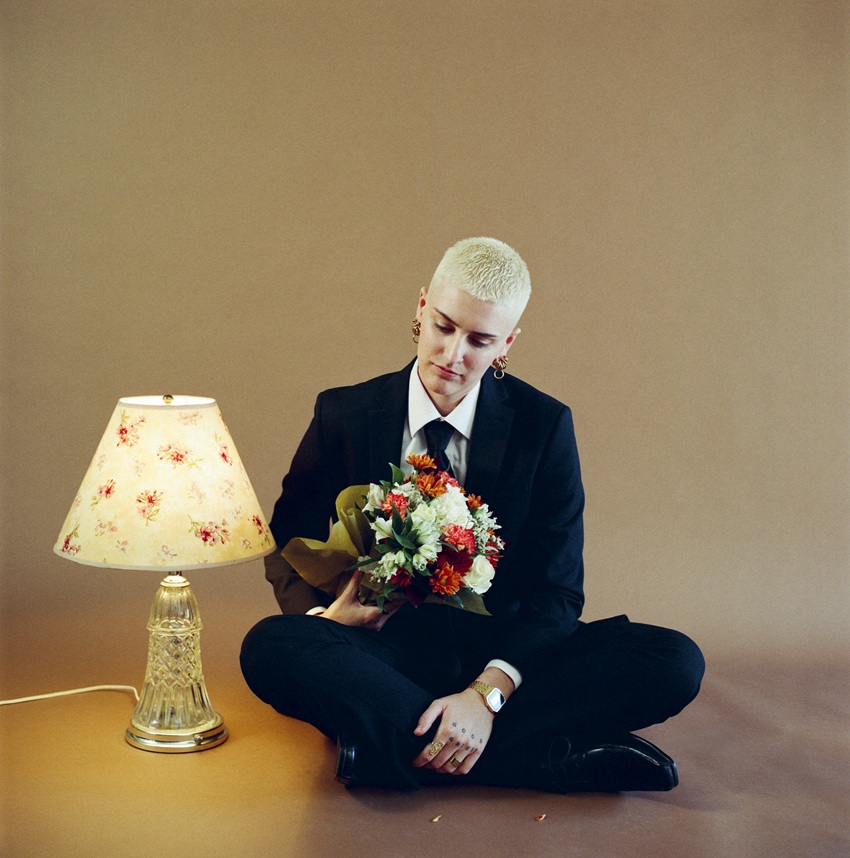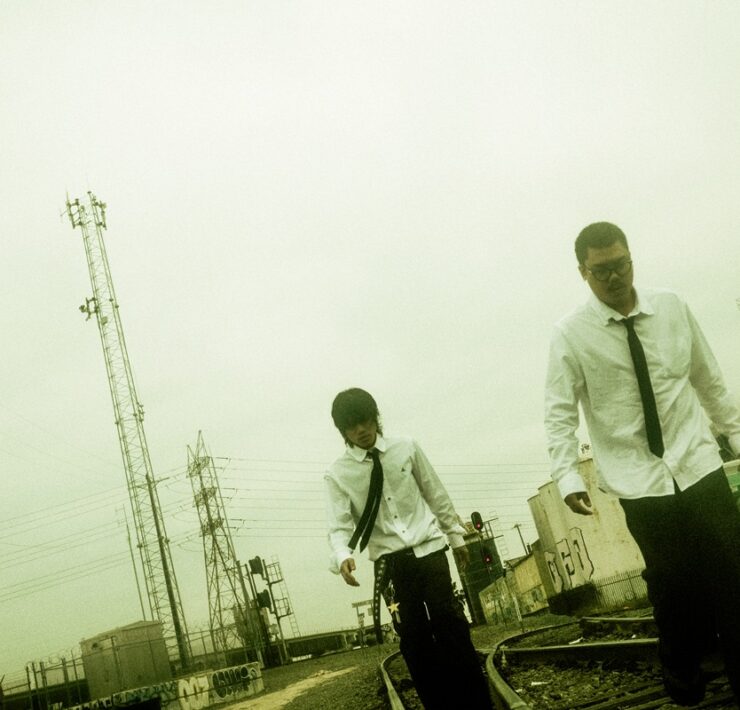The More Grown-Up Version of ‘Good God!’: Rio Romeo Chats About ‘Good Grief!’

Rio Romeo rose to fame when their brutally honest, heartbreakingly poignant, devastatingly vulnerable song “Nothing’s New” became a viral sensation on TikTok, leading to hundreds of millions of streams on Spotify and a massive fanbase. Their newest album, Good Grief!, offers candid storytelling full of sincere emotions, powerful vocals, fun, upbeat choruses, and ravishing instrumentation.
Romeo chats with OFM about Good Grief!
Serving as a Companion Piece to Good God!
Good Grief! serves as a companion piece to 2022’s Good God! “None of the songs were meant to be on Good God!, but some were written during the same time period or even a little bit before,” says Romeo. “This was always going to be the more grown-up version of Good God!. When I first started recording, Good God! I was doing the best with what I had. Over the years, I’ve worked more with music, becoming a better musician and clearer artist. This is kind of what that project has culminated into this second part.”
Grief Processing
As the title suggests, the tracks on Good Grief! heavily deals with grief. “It’s really an homage to the very incredibly hard process of carving out the life that I wanted to live and that I felt entitled to pursue,” they reflect. “I really had to give up so much in terms of my support system and my family dynamic. Choosing to be presenting as a butch and pursuing to be an artist, honestly and openly making music about being a lesbian for other lesbians, is a really radical choice based on the environment that I grew up in. It came with incredible growing pains.
I went through the grieving process of quite a few different things,” recalls Romeo. “One being my physical health, and not knowing if I’m ever gonna be able to walk again without being in pain. That’s, like, really intense for a 21-year-old to go through. With that I also grieved the support structure that I had and the family life that I thought I expected I would have my entire life, and just grieving this life that I thought I would have. All these what I now recognize as privileges of being able-bodied, having a comprehensive support structure, and having a predictable life, I no longer had that. These songs helped me work through some of that hard time.”
The track listing of Good Grief! is emblematic of the grief process itself, especially with how “I Might Be The Problem” follows up “Driving Home Homeless.” “It was challenging putting together the second half of the album, and ‘I Might Be The Problem’ sounds so up, and it’s so pop and so anthemic, and putting it next to ‘Driving Home Homeless is definitely a choice because it throws you into this thing,” comments Romeo. “I also think it’s reflective in a way of how jarring the process of growing into your own self, the process of grief and healing, and understanding your place in the world can be and how you’re just thrown from one thing to another. It’s a choice for sure, but I think the disruption of it is reflective.”
A More Hands-On Approach in Production
Mike Irish is the producer Romeo worked with for Good Grief! However, with Good Grief! Romeo had a greater hand in producing than in previous records. “Before, it was like I would write a song, and then I would have this piano and vocal track just like as a recording,” they comment. “I would do everything in one take and record it, all in one chunk and give it to a producer and be like, ‘Make this bigger,’ essentially. I was able to use the skills that I’ve honed over the past couple of years in production and be able to have a more articulated sort of language behind the music that I’m making in this project, which I think was less limited by knowledge. I’m just more fluent in production, and so I was able to make a lot more creative choices given that I have the language to express it now.”
Romeo had a lead hand in producing “JOHNNYSCOTT.” “The different sound that ‘JOHNNYSCOTT’ has is really coming from a place of play as a producer,” they say. The song was created when Romeo had intense hip issues, which confined them to their bed for a long time. “I had ample time to sit there and figure out how to use Logic and better myself as a musician and producer. I was trying very much to make the best out of what I had in that situation. I was frankly pissed off about a lot of things. It was especially prompted by this conversation with my partner as we were talking about just how fucking shitty that this guy is out there grooming all these girls, and I was one of them, and how it feels like he gets no justice. My partner was like, ‘You should be really more mad about that. I don’t know why you’re not madder. That’s so fucked up. You should be pissed off.’ It was very empowering to hear that and feel like someone is giving me permission to be mad about it, and then being able to channel that into a place of play and creativity within my newfound skills as a producer.”
Part of this play is that, although the song is based in truth, it takes a make-believe ‘what if’ direction. “It’s fun because I am saying what I want to say with my chest,” shares Romeo. “Growing up in a really conservative environment and as a Christian woman and wife, I think my experiences have been like, that’s very frowned upon, of saying whatever you’re feeling with your chest. You’re supposed to filter yourself as much as you can. It’s really just very empowering for me. It’s really fun. Now I’m playing all these live shows and going on tour in the fall, and I really enjoy playing that song live, too, because I get to talk about how much I fucking hate this guy.”
Writing Love Songs About Their Partner and City
“All Mine” is a classic love song. “Writing love songs are so easy for me because I’ve been with my partner, who I love, for many years,” comments Romeo. “It’s such an easy source material for me to tap into. But there is that challenge of like, ‘Am I making this too corny?’ This song was coming from a place of tenderness, love, and sensuality in my relationship. It was really based on truth. I think that’s where you can put your blinders on if it’s corny or not, because if it’s true, who cares if it’s corny.”
“California” is one of Romeo’s favorite songs to play live. The song is about Romeo’s love for Pomona, the city they grew up in. “I really do feel such a sense of dedication and love for the area that I grew up in, which is where I still live today,” they comment. “It’s a really interesting experience growing up here because LA is just an arm’s reach away, but you’re still separated in this community. I just feel a real sense of purpose being rooted in my community and being involved with other artists in the area, and I really enjoy singing about it. I really enjoy feeling like other people can understand me and where I’m coming from and get a glimpse of what has made me into who I am, which is where I grew up and currently live.”
Being Vulnerable in Music
Romeo’s music is honest, raw, and vulnerable. Writing is always incredibly therapeutic for them, not just in their music but in general. “My artistic practice as a person just involves a lot of talking about how I feel,” they share. “I’ve been keeping journals my entire life, just using them as a way to vent or document. It’s not always just about talking about bad stuff that’s happening. It’s also just, ‘I had a wonderful day. Here is the receipt from the restaurant that I went to. It was so fun to hang out with my friend.’”
Romeo has a good sense of when an emotion needs to be put in a song. “A lot of the time, if I have this really strong emotion, whether it be happiness or despair or whatever, and it just needs to be more than a journal entry or a drawing; it has to be music,” they comment. “It is very cathartic. I very much feel an emotional release. It’s on a double side, also really hard. Being vulnerable and not being able to anticipate how people are going to react to your vulnerability until the cat’s out of the bag is something that’s challenging. As my platform and career grow, it’s getting a little more scary because you just don’t know who your music is going to touch, and you don’t know how they’re going to react, and that’s okay. That’s just part of being an artist.”
Utilizing Experimental Techniques
Good Grief! sees Romeo experimenting more with sound, structure, and production. “Within the time period, there was just so much learning and experimenting that I did,” they say. “I cannot even stress you or make you understand how much time I had sitting there on my freaking laptop with nothing to do because my hip hurt so bad. So, I had a lot of years in this project to play and figure out what I liked. I think it really informed the work. ‘Interlude’ and ‘Driving Home Homeless’ are pretty experimental songs.”
“Interlude” is a fascinating instrumental and serves as a callback to the previous song, “All Mine,” as it features the same motifs. “The interlude really serves as a breath of fresh air in the middle of the project,” shares Romeo. “It’s such a beautiful arrangement. It was mostly made by the producer Mike. He was super into the song and the source material that I brought him for the song ‘All Mine.’ It had all these background vocals, and he just sent it to me—All the parts of that song that I think make it really interesting, he amplified it and made it into its own little piece and a little breath of artistic expression and space in the album. I’ve actually never released an instrumental track in my catalogue, so it’s cool because it’s just something a little bit different. Also, since I have a background in musical theatre, it’s kind of an overture of the previous song.”
Meanwhile, “Driving Home Homeless” is a cathartic stream-of-consciousness song in which Romeo powerfully lets out all their thoughts and feelings. “I had this voice memo that I took in my car, and then I put it in GarageBand and built a sonic world around that,” they say. “It stands on the album really, really close to how it was originally made back in 2020. It’s one of those things of I would never choose to make that song the same way because I know better now. But I also think that that song stands as such a timestamp in that period of my life, and the emotions I was experiencing and the pain I was going through. I could never do it justice again, even if I could sing it exactly like the recording. The time and energy of the piece is really what holds its artistic value, in my opinion.
One of Romeo’s favorite experimental parts is in “Orchard Of One.” “It’s near the end of the song, and there’s this little click that happens, and it’s actually the click of an MRI, and it’s a percussion element in the song,” they explain. “That came about because I was talking to the producer, Mike, with whom I was working on this with. I was showing him this song that I made, a very experimental instrumental song that’s all based around an MRI machine, and I built a song around it. He was like, ‘Oh, that’s really cool. We should put that into this.’”
It also serves as a little ‘timestamp’ moment. “I recorded these songs over the span of five years, and I probably got, like, 20 MRIs, like I’m talking so many freaking MRIs because of all my health issues,” says Romeo. “Alongside my hip injury, I had a brain injury. I just got so many MRIs. It felt like I had a little ‘he he’ moment of all my health struggles in there.”
Concluding Comments
Good Grief! is a very personal record for Romeo, and they are happy to share it with the world. “I feel very cemented and solid in the life that I’ve chosen, and the sacrifices that I’ve made to get here, but it was not easy,” they reflect. “One of the things that helped me wrap my head around what I was going through was that this is not a new experience. So many other queer people throughout history have experienced the ‘death’ of their family, the complete loss of everything that they knew in pursuit of better things. If you need to make that radical choice of being able to be who you are, you’re not alone in that.
Being able to write music about it that I then can share with other people who will undoubtedly go through the same shitty thing I went through, and know that, unfortunately, this is not a new thing. They are not alone in what they are going through. There is a community to be found—I feel like I have a lot that I’ve learned personally and can share with other young queer people of just like, ‘shit sucks.’ Eventually, I know everyone says it, but it will get better. You will, despite how hard it is or how many sacrifices you have to make, you will find who you are, and it will be awesome.”
Follow Rio Romeo on Facebook, Instagram, or X (Twitter) to keep up to date with the latest announcements.










